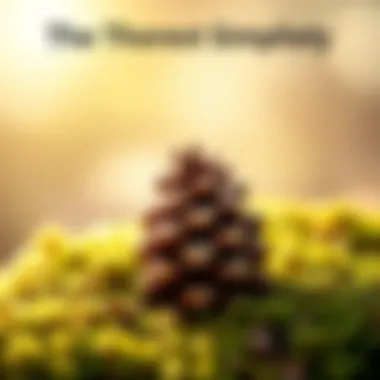Exploring Thoreau's Walden: Nature and Society Insights


Intro
Henry David Thoreau's Walden remains a key foundational text in American literature and philosophy. Its relevance stretches far beyond the confines of its publication in the mid-19th century. As we peek into Thoreau's world, a contrasting landscape of modern society emerges, providing readers with valuable insights into the balance between individualism and community. Exploring his time spent at Walden Pond, we dive into themes of self-reliance, simplicity, and nature’s profound connection to human existence.
Categories of Life-Changing Books
The genre of life-changing books is vast, but one can narrow it down into two significant categories that resonate deeply with Thoreau's Walden.
Self-Help and Personal Development
Thoreau’s work stands as a monument of self-help literature, advocating for introspection, self-discovery, and the transformative power of nature. In an age inundated with distractions, his call for personal growth through solitude and simplicity rings quite true. His assertion that one must learn to live deliberately inspires us to shed the noise and embrace what is essential. Key points from this category often include:
- Self-Reflection: Taking time to know oneself beyond societal expectations.
- Minimalism: Encouraging a lifestyle stripped of excess for mental clarity.
- Purpose: Driving home the idea that each person's journey is unique.
Fiction with Transformative Themes
While Walden is primarily a nonfiction narrative, its story-like element unfolds its philosophy in a way that feels deeply personal. The transformative journey Thoreau embarked upon at Walden Pond can be seen in countless works of fiction that encourage self-discovery and deeper understanding of nature. Books in this genre often explore intrinsic themes, such as:
- Nature's Influence: How the natural world shapes our identity and beliefs.
- Communal Bonds vs. Solitude: The push and pull between connection and independence.
- Life Choices: The moral and ethical dilemmas one faces on the path of self-reliance.
Book Summaries and Insights
Gaining insights from Thoreau's timeless text offers a treasure trove of wisdom applicable in contemporary life. Overall, Walden showcases the intricate relationship between self-reliance and the environment, advocating for an enriched existence by embracing simplicity.
Key Takeaways from Popular Titles
Through Walden, we absorb lessons on:
- The value of silence and contemplation in our busy lives.
- The importance of connecting to nature for mental well-being.
- The power of individual action in driving societal change.
How to Apply Insights in Daily Life
Integrating Thoreau's insights doesn’t require retreating to the woods but rather finding moments in everyday life to connect with these principles. Practicing self-reliance can manifest through:
- Digital Detox: Minimizing time spent on screens to reconnect with oneself and the environment.
- Nature Walks: Taking walks in local parks to foster a connection with nature.
- Journaling: Regularly reflecting on one's thoughts and experiences to promote personal growth.
"The mass of men lead lives of quiet desperation. What is called resignation is confirmed desperation." - Henry David Thoreau
In summary, the exploration of Walden not only highlights Thoreau's philosophy but also underscores its direct relevance to modern challenges and personal development. Armed with these insights, readers can cultivate a more intentional and nuanced approach to life.
Prologue to Walden
"Walden" is not just a book; it is a meditation on the relationship between humanity and the natural world. This section aims to unpack the significance of Thoreau's work as it offers a unique perspective on self-reliance, simplicity, and the essence of nature. By seeking to live deliberately, Thoreau invites readers to reconsider their lives in a world increasingly dominated by industrialization and material pursuit.
Context and Background
To grasp Thoreau's message, it is essential to understand the historical backdrop of the mid-19th century America. This period was marked by rapid industrial growth and urbanization. Individuals were caught in the rush of progress, often sacrificing personal well-being for economic gain. Thoreau, aware of this shift, decided to step away from societal noise. He retreated to a small cabin near Walden Pond for two years, a choice fueled by his desire to immerse himself in nature and delve into a more meaningful existence.
Thoreau's background, influenced by Transcendentalism, also played a crucial role in shaping his thoughts. This philosophical movement advocated for intuition and the inherent goodness of people and nature, marking a stark contrast to the prevailing materialistic ethos. In turn, this context is vital, as it showcases Thoreau's radical stance as one that sought not only personal transformation but societal change.
Thoreau’s Purpose
In "Walden," Thoreau seeks to explore the purpose of life beyond the trappings of modern society. His purpose can be distilled into a quest for authenticity, a theme that permeates his writings. Living in isolation, he engages in self-examination and reflection, allowing him to illuminate fundamental truths regarding human existence.
This quest challenges readers to confront their own life choices. Thoreau urges individuals to simplify their lives, to discard unnecessary clutter, both material and psychological. His intention is clear: by stripping down to the bare essentials, one can find clarity and insight. He wants others to recognize that comfort does not lie solely in possessions; rather, it may be found in experiences and connections with nature.
Overall, the introduction to "Walden" serves as a valuable foundation for understanding Thoreau's insights into nature and society. It sparks critical thought and encourages a reassessment of how we navigate our lives in alignment with our values and aspirations.
Life in the Woods


In Henry David Thoreau's Walden, the concept of life in the woods is not merely about physical solitude; it is a vehicle for deep introspection and personal transformation. Thoreau’s choice to retreat to the woods symbolizes a desire to escape the relentless pace of industrial civilization. This section delves into how living amid nature fosters an environment ripe for reflection, allowing individuals to connect with both the external world and their internal selves. It highlights key benefits of such an existence that resonate with modern readers seeking solace in a chaotic society.
Isolation and Reflection
Thoreau believed that isolation offers a unique vantage point, one where true understanding can emerge. In this quietude, he found clarity that often eludes those entangled in daily distractions. Being alone in nature provided Thoreau the opportunity to engage profoundly with his thoughts, free from societal norms that often dictate one’s way of thinking.
- Quietness as a Canvas: The serene environment of Walden Pond became a blank canvas for Thoreau’s thoughts, encouraging him to articulate his philosophies in ways he might not have been able to in bustling society. This sharp contrast between civilization and wilderness drew out insights regarding the indispensable value of solitude.
- Self-Discovery: Thoreau’s solitude spurred rigorous self-discovery that many chase in today’s complex world. He wrote about his observations, not just of the natural elements around him, but also of his own psyche, leading to deeper understanding of his beliefs and ideals.
"I never found the companion that was so companionable as solitude."
In times when digital communication often replaces genuine connection, Thoreau’s experiences remind us that loneliness can sometimes lead to profound companionship—with oneself. Engaging with the vastness of the woods encourages a reflective approach to life, fostering a sense of self that goes beyond surface-level existence.
Daily Routine
Routine plays a pivotal role in how one interacts with their environment. Thoreau’s daily life is characterized by simplicity and purpose, highlighting basic human needs while emphasizing the richness of everyday activities. Living the life of a hermit, Thoreau’s days were punctuated with meaningful labor and observations that grounded his existence in the natural order.
- Rising with the Sun: Thoreau embraced the rhythm of nature, often waking at dawn. This seemingly mundane act placed him in accord with the world around him, captivating the simple beauty of morning light as it gradually painted the landscape.
- Work as a Philosophy: Rather than viewing labor as a mere means to an end, Thoreau found fulfillment in ordinary activities like farming and maintenance of his cabin. This approach underscores the idea that work, when aligned with personal values, becomes a pathway to self-reliance and enrichment, rather than just a task.
- Engagement with Nature: Daily walks became a cornerstone of Thoreau’s routine. These excursions into nature were not just for leisure; they were a form of meditation and study. Observing everything from the rustle of leaves to the behavior of wildlife enhanced his understanding, not only of the environment but also of his place within it.
In essence, Thoreau’s daily routine reflects an intentional lifestyle that intertwines simplicity with depth, offering a stark contrast to the often mindless occupations that fill contemporary lives. Through his experience in the woods, he sheds light on how a deliberate daily practice aligns us closer to the rhythms of life, both internal and external.
Themes of Self-Reliance
The notion of self-reliance stands as a formidable pillar within Thoreau's Walden. This theme interweaves with both personal growth and a critique of societal norms. Thoreau’s exploration of self-reliance offers readers a mirror to introspect upon their own habits, values, and beliefs. He advocates for the idea that true independence comes from within, urging individuals to seek authenticity beyond societal expectations. By embodying self-reliance, Thoreau proposes not just a lifestyle choice but a transformative philosophy enabling one to cultivate inner strength amidst external pressures.
Economic Independence
Minimalism in Action
Minimalism, as explored by Thoreau, revolves around the pursuit of simplicity and the reduction of excess. It's not merely a lifestyle centering on owning fewer things; it’s a declaration against the clamor for material goods that dominate modern life. Thoreau practiced minimalism in his daily routine at Walden Pond, choosing only to surround himself with what was necessary. This specific aspect highlights that the essence of minimalism lies in freeing oneself from societal chains that bind us to consumerism.
The key characteristic of this approach is its emphasis on intentional living. By shedding the unnecessary, individuals can focus on what truly matters, which often leads to a deeper fulfillment and tranquility. For many, this journey to minimalism emerges as a beneficial choice, fostering clarity in thought and purpose.
However, embracing minimalism can also come with its challenges. The unique feature here is the struggle against societal norms that equate worth with possessions. While the advantages may include reduced stress and enhanced well-being, there can be societal pushback against what might be seen as a "radical" lifestyle choice. Despite this, the movement towards minimalism underscores the ever-growing importance of self-reliance, echoing Thoreau's philosophies in contemporary discussions.
The Value of Labor
The value of labor, another striking element in Thoreau’s work, connects closely with his ideals of self-reliance and personal responsibility. Thoreau emphasized not just the act of labor but the understanding that work contributes significantly to one’s sense of purpose. This insight sheds light on the intrinsic value that comes with engaging in labor, whether it is physical or intellectual.
A key characteristic of this concept is the dignity that labor bestows upon the individual. Working with one's hands or mind fosters a connection with reality that is often lost in today’s digital age. The practice of valuing work resonates strongly with Thoreau's assertion that labor is an essential part of life, forming the backbone of a self-sufficient existence.
In the practical realm, this belief in labor can be incredibly formative; it teaches responsibility and develops skills essential for survival. Yet, it also brings to light some disadvantages. In a world that often views labor as a means to an end, one might find themselves undervalued and overworked. However, Thoreau's approach urges a rethinking of this concept, suggesting that when one sees labor as a path to personal growth and freedom, it can lead to a richer, more fulfilling life.
Philosophical Underpinnings
The philosophical underpinnings of self-reliance are well-articulated in Thoreau's narrative. They revolve around concepts of individualism, personal authority, and a deep respect for nature. Thoreau challenges individuals to listen to their inner voice and act in accordance with their own beliefs rather than succumb to societal pressures. This is a clarion call for mindfulness and an invitation to deeply examine one's principles.
Ultimately, this self-reliance is not just about withdrawing from society but is about establishing a more profound connection with oneself and, concurrently, with the natural world. It encourages readers to reflect on their role within the broader social fabric while fostering a robust sense of individual identity.
In the end, self-reliance emerges as a guiding principle for navigating life, inviting us to reclaim agency over our choices and impressing the significance of simplicity and labor in fostering meaningful existence.
Connection to Nature
Exploring Thoreau's Walden reveals a profound connection that humanity shares with nature. In this work, Thoreau encourages readers to step away from the chaos of society and immerse themselves into the natural world. He posits that embracing nature not only nourishes the spirit but also fosters a deeper understanding of oneself. Thoreau's reflections highlight the importance of observing natural cycles, which serve as reminders of life's impermanence and continuity. Understanding this connection allows for a richer existence, one grounded in both awareness and appreciation of the world around us.
Observations of Seasons
Thoreau's meticulous observations of the changing seasons in Walden showcase his keen awareness of nature's rhythms. Each transition—from the thawing of winter to the blooming of spring—offers insight into the cycles of life that echo through human experience. For example, he describes the gradual awakening of flora and fauna, which can be likened to a slow but inevitable rebirth after the long dormancy of winter. This observation isn't just poetic; it reflects the larger theme of renewal and the eternal dance of life.
- The melting snow signals a turning point, welcoming the return of life.
- Spring brings forth blossoms that not just beautify the landscape, but also highlights the resilience of nature.
- Summer's vibrancy captures a peak, representing abundance and vitality before the incoming leisure of autumn.


These seasonal shifts are metaphors for the human experience, pushing individuals toward reflection on their own stages of growth and decay. Nature’s transitions remind us of the passage of time and encourage us to live deliberately throughout all life’s phases.
Natural vs. Artificial Life
Exploring the dichotomy between natural and artificial life is essential in understanding Thoreau's philosophy. He viewed the encroachment of artificiality on the natural world as detrimental to the human spirit. For him, modern conveniences and societal expectations often lead to disconnection from nature, which can stifle personal growth.
Thoreau presents a stark contrast:
- Natural life offers authenticity, presenting opportunities for genuine experiences and self-discovery.
- Artificial life, filled with distractions and superficiality, detracts from one's ability to connect not only with nature but also with oneself.
This realization prompts a critical question: How much artificiality are we willing to accept before we lose our connection to the core of our existence? Thoreau’s observations serve as a wake-up call, reminding readers of the value of simplicity and the need to prioritize a life that reflects true connection with the world around us.
"In wildness is the preservation of the world." — Henry David Thoreau
Through the lens of Walden, Thoreau offers not just critiques, but a heartfelt plea for reconnection to our roots in nature and authenticity to foster personal and societal growth. Not only does this guide serve as a roadmap to living simply, it is also a vital reminder of the perils of modern life.
Interpreting Simplicity
In the narrative of Thoreau's experience at Walden Pond, the notion of simplicity carries a profound weight. It is not merely a lifestyle choice but a philosophy deeply embedded in the fabric of his experiments. Thoreau’s perspective fosters an enriching dialogue on the importance of paring down life's excesses, offering pathways to a more meaningful existence. This section unravels the intricate layers of simplicity that permeate his work, shedding light on its relevance today.
Philosophy of Simple Living
Thoreau’s philosophy of simple living is rooted in the idea that true contentment lies beyond material accumulation. He advocates for a life that prioritizes personal fulfillment and connection to nature over the superficial allure of consumer goods. Thoreau invites us to question societal pressures that dictate our desires, illustrating that a rich life doesn’t require a heavy wallet.
In practice, simple living means evaluating our needs versus wants. This philosophy encourages individuals to live intentionally, focusing on what truly matters. For instance, Thoreau describes his humble cabin—crafted from basic materials—that serves as a sanctuary for reflection rather than a showcase for wealth.
The benefits of embracing simplicity are manifold. By removing distractions, we open ourselves to deeper reflections, allowing for personal growth and clarity of purpose. As Thoreau poignantly states, "Simplify, simplify." Stripping away the clutter fosters an environment conducive to creativity and self-discovery.
Critique of Consumerism
Thoreau's critique of consumerism stands as a clarion call for mindfulness in an age that worships wealth and possession. His writings articulate a scathing indictment of a society obsessed with material gain. He scrutinizes the constant pursuit of the latest gadgets and status symbols, asking what they truly contribute to a fulfilling life.
In today’s fast-paced consumer-driven world, Thoreau’s insights resonate more than ever. The relentless chase of the newest trend often leads to emptiness rather than satisfaction. He believed that consumer culture distracts individuals from their innate connection to nature and each other, pulling them away from what is genuinely enriching.
Thoreau’s observations encourage us to pause and interrogate our habits: Are we buying out of necessity or simply responding to societal expectations? In challenging consumerist values, he advocates for conscious consumption, urging individuals to invest in experiences and personal growth rather than possessions.
"The price of anything is the amount of life you exchange for it."
For further insight into Thoreau's philosophies and their impact on both literature and environmentalism, you might explore resources at Britannica, or check community discussions on platforms like Reddit.
Society and Isolation
In Henry David Thoreau's Walden, the interplay between society and isolation offers rich ground for exploration. This theme underscores the crux of Thoreau’s insights into human experiences and the fundamental need for reflection in a fast-paced world. Thoreau didn’t just retreat into nature for peace; he posed deep questions about the very fabric of societal norms. He considered whether social constructs benefit or hinder individual growth, making his thoughts on society and isolation both timely and timeless.
Criticism of Society
Thoreau's criticism of society digs deep into the core of human behavior. He saw the bustling, mechanized world as one shadowed by frivolity and distraction. In Walden, Thoreau outlines how modern society often prioritizes materialism over meaningful existence.
"The mass of men lead lives of quiet desperation. What is called resignation is confirmed desperation."
In just a few words, Thoreau encapsulates a profound truth about societal pressures. He believed that many individuals live in a cycle of unfulfilling routines, shaped by external expectations rather than genuine desires. This relentless pursuit of status and wealth can lead to a disconnected existence, a point that resonates even more in today's hyper-connected world.
A few key aspects of Thoreau's critique include:
- Materialism: Thoreau points out that society’s obsession with possessions distracts from the pursuit of happiness. He advocates for simplicity, urging individuals to seek wealth not in things, but in experiences and self-discovery.
- Conformity: The pressure to conform binds individuals, stifling creativity and self-expression. Thoreau champions individual thought and encourages people to forge their own paths, even if that means standing against the tide.
- Busyness and Noise: In Thoreau’s view, the constant distractions of society prevent authentic thought. Living simply and isolated, he suggests that one can listen to their own thoughts and gain clarity.
Through these lenses, Thoreau compels us to reconsider our relationship with society, urging a critical evaluation of our lives.
Individualism and Community


While Thoreau emphasizes individualism as a path to personal growth, he also recognizes the importance of community. Individualism, to him, does not mean living in a vacuum. Instead, it’s about cultivating an authentic self that can engage with others in meaningful ways. This duality presents a fascinating contrast—individuals can thrive not just when isolated, but also when actively engaged with their communities, as long as the engagement is genuine.
- Balancing Act: The challenge lies in finding the right balance between self-reliance and social connection. Thoreau offers a perspective that one can benefit from community values while still retaining one's uniqueness. He suggests that true strength lies in individual voices coming together for communal good, however, this shouldn’t mean sacrificing personal authenticity.
- Mutual Growth: Thoreau hints that a true community embraces individualism. When each person is allowed to flourish, the community as a whole can thrive. This idea resonates profoundly today, as collaborations within communities can lead to innovative solutions and enriched lives.
- Support Systems: Isolation can breed creativity, but healthy communities provide essential support systems. They enable individuals to share ideas, challenges, and victories, leading to personal and collective growth. Thoreau’s reflections shed light on how isolation is not merely a withdrawal from society but a space for regeneration that can enhance communal relationships.
Through Thoreau’s lens, society and isolation are not opposing forces; they can exist in harmony, each enhancing the other. This dual engagement can lead to enriched lives where individual and community values coexist and flourish, reminding us of the nuanced relationship humans have with society.
Enduring Legacy of Walden
Exploring the lasting influence of 'Walden' is like peeling back the layers of an onion; each layer reveals the depth of Thoreau's thought and the resonance of his ideas across different eras. It’s not just about retreating to the woods; it’s about understanding the human spirit in connection with nature and the society we create around ourselves. The enduring legacy of this work shapes contemporary thoughts on individuality, minimalism, and environmentalism, and it remains a reference point in discussions about modern existence.
Impact on Literature
Thoreau’s writing style has had a profound impact on literature, influencing countless authors and thinkers. His use of vivid imagery and introspective prose started a conversation that continues in literary circles today. Thoreau's blending of philosophical pondering with rich environmental descriptions creates a unique narrative style that resonates with readers and writers alike.
- Transcendental Thought: Many modern writers draw inspiration from transcendentalist themes found in Thoreau’s work. The call for introspection and a deeper connection with nature influences poets and prose writers, encouraging them to explore similar themes of self-discovery and reflection.
- Nature Writing: Thoreau’s keen observations of nature paved the way for the genre of nature writing. His meticulous descriptions of seasonal changes and wildlife have inspired authors from John Muir to Annie Dillard, reaffirming the need to establish a relationship with the natural world.
- Social Critique in Literature: 'Walden' also critiques societal norms, a theme that finds resonance in modern literary criticism. Writers who seek to challenge the status quo or who explore the paradoxes of contemporary life often cite Thoreau as a touchstone.
Influence on Environmentalism
The environmental movement owes much to Thoreau's early advocacy for nature and the idea that human beings are an intrinsic part of the ecological system. His insights encourage a relationship with the environment grounded in respect and responsibility. Today, we see many of these principles echoed in modern environmentalism.
- Sustainable Living: Thoreau’s philosophy of living simply and sustainably resonates strongly today. Individuals and organizations promoting sustainable practices often reference 'Walden' to articulate the importance of ecological awareness in daily living.
- Conservation Advocacy: The ideas in 'Walden' laid the groundwork for the conservation movement. Thoreau’s belief that nature holds a spiritual and moral significance informs current efforts to preserve natural landscapes and biodiversity.
- Activism and Awareness: Thoreau’s thoughts on civil disobedience and moral responsibility also have a profound impact on environmental activism. Many activists today reference his ideas when advocating for legislative change or standing against environmental degradation.
"In wildness is the preservation of the world."
— Henry David Thoreau
In both literature and environmentalism, Thoreau's influence remains a guiding light for those seeking to understand their role within nature and society. His work compels us to look inward and act outwardly, reflecting on our place in a world that often moves too fast.
Thoreau and Modernity
In a world bustling with rapid advancements and unceasing noise, Henry David Thoreau's reflections in Walden shine like a beacon of clarity. His insights, though penned in the mid-19th century, maintain a striking relevance today. The connection between Thoreau’s exploration of life at Walden Pond and the technological chaos of modern society presents a compelling dichotomy that speaks volumes about human existence. Thoreau's call for simplicity and introspection challenges the relentless pursuit of progress, prompting readers to reconsider their relationship with nature amidst the demands of contemporary living.
Relevance in Today’s World
Thoreau’s message rings true in the context of modernity, especially when juxtaposed against consumer culture and environmental decay. As people pursue convenience and immediate gratification, Thoreau’s emphasis on self-reliance prompts a necessary reflection. Many today live in urban environments, often disconnected from nature and searching for their identities.
- Thoreau advocated for an authentic life, urging us to reduce distractions and embrace solitude.
- The modern hustle often leads to burnout and dissatisfaction, resonating with Walden's themes of introspection and withdrawal from the frenzy of life.
- His example serves as a reminder of the benefits of stepping back—a lesson valuable in an era of constant connectivity and digital distractions.
In light of climate change and ecological crises, Thoreau’s attention to nature becomes ever more crucial. His observations encourage us to not just appreciate the natural world but also to engage with it, advocating for sustainability and environmental stewardship.
Lessons for Contemporary Living
Examining Thoreau’s life and writings offers several lessons that can be applied directly to today’s challenges. One might say that he provides a sort of manual for thriving in a chaotic world.
- Mindfulness and Presence
Thoreau’s solitude was not merely about being alone; it was about being present. Practicing mindfulness can ground individuals amid the distractions of modern life. His walks in nature remind people to engage with their environment in a meaningful way. - Intentional Living
Only acquiring what is necessary can lead to psychological freedom. Thoreau’s minimalist philosophy encourages people to focus on quality rather than quantity in all aspects, whether it’s possessions, relationships, or experiences. - Embrace Nature
Nature plays a critical role in well-being and happiness. Thoreau’s writings inspire individuals to seek time outdoors, highlighting the necessity for balance between urban life and natural surroundings. - Self-Reliance
His commitment to self-reliance can empower individuals to trust their instincts and choose paths that align with their values. This idea resonates with those who feel the pressures of societal norms and expectations.
"The price of anything is the amount of life you exchange for it."
– Henry David Thoreau
In essence, Thoreau's legacy encourages questioning the status quo. As our world grows increasingly complex, his insights challenge us to pursue a simpler, more intentional existence that honors both our well-being and the natural environment around us. Thoreau, with his profound observations, remains not just a voice from the past but a guide for the present and future generations.
Culmination
The conclusion brings together the intricate threads of Thoreau's thoughts and experiences outlined in this article. It serves as a reflective checkpoint, inviting readers to ponder not just what they have gleaned about Walden, but also how those insights resonate with their own lives. The importance of examining Thoreau's philosophy in relation to our current socio-environmental challenges cannot be overstated.
Thoreau's emphasis on self-reliance and a simple lifestyle encourages individuals to critically assess their own consumption habits and reliance on societal constructs. By urging readers to connect with nature and dismantle the complexities of modern life, Thoreau's messages become relevant touchstones for those grappling with the chaos of contemporary existence.
Final Thoughts on Thoreau
To wrap things up, Thoreau's journey into the woods at Walden Pond was more than just a search for solitude; it was a profound exploration of humanity's place within nature.
- Inspirational Insight: Thoreau encourages individuals to seek their own passions and alignment with the natural world. This awakening to the essence of living can prompt a more fulfilling existence.
- Critique of Modern Norms: Thoreau’s skepticism toward societal conventions inspires a dialogue about the pressures we face from consumer culture and the relentless pursuit of more.
- Lessons in Awareness: Thoreau challenges us to observe our surroundings, fostering a deeper appreciation for the beauty in the simplicity of everyday life.
In summary, Thoreau's reflections in Walden are not merely historical musings; they represent an enduring set of principles calling for authenticity, connection, and conscious living. Amid the buzz of modern-day distractions, his work remains a rallying cry for introspection and simplicity, compelling readers to carve a path that resonates with their inner values.
"In the long run, men hit only what they aim at. Therefore, though they should fail immediately, they had better aim at something high." — Henry David Thoreau
For more insights on Thoreau's impact, you can refer to resources like Encyclopedia Britannica and Wikipedia. Additionally, platforms like Reddit may provide lively discussions surrounding Thoreau and his philosophical contributions.















